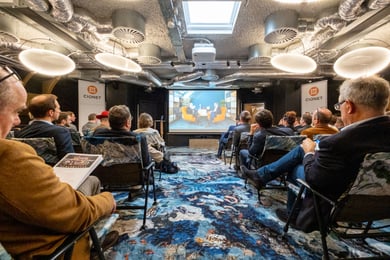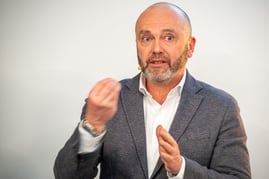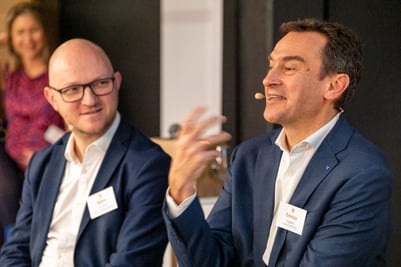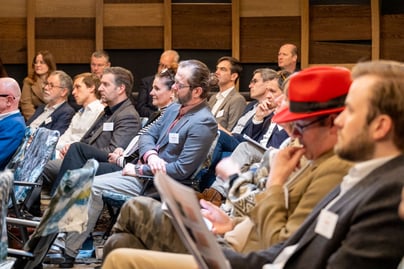.png)
The European and Belgian panels featured the following participants:
The European panel:
The local Belgian panel:
During the conference, we also launched the CIONET COOKBOOK N°2, in partnership with Red Hat and Intel. This unique book includes recipes from 20 influential digital leaders across Europe, including one of our Belgian members Michał Paprocki MC, Group CIO at Euroclear.
Digital Sovereignty, Digital What?
Digital sovereignty refers to a country's ability to exercise control over its digital infrastructure, data, and online activities in order to protect its security, economy, and values. For Europe, digital sovereignty means reducing dependence on foreign tech companies, ensuring that data is stored and processed within the EU, and developing European digital technologies and standards. This involves creating a regulatory framework that enables the EU to shape the digital market and foster innovation, while also safeguarding citizens' privacy and promoting a free and open digital environment.
Digital Sovereignty Research presentation by TNO: Claire Stolwijk
 The conference started with a presentation on Digital Sovereignty by Claire Stolwijk from TNO, live from the Data Spaces Symposium in The Hague in The Netherlands.
The conference started with a presentation on Digital Sovereignty by Claire Stolwijk from TNO, live from the Data Spaces Symposium in The Hague in The Netherlands.
Claire presented the key findings from a joint research 'Digital sovereignty: How Europe takes back control' by CIONET and TNO, realised by interviewing 20 CIOs across Europe, exploring how CIOs can make a difference and understand how individual companies are affected by the need for digital sovereignty.
The key findings showed that an open approach to digital sovereignty is the best solution for the future of Europe, and developing secure data-sharing infrastructures across Europe can restore Europe’s digital sovereignty and boost European businesses. To learn more about the key takeaways from the study, check out our international blog post by clicking here.
The European Panel
Afterwards, we proceeded with a European panel discussion moderated by Daniel Eycken, COO of CIONET, where a comprehensive and open conversation was held on the essential challenges and potential solutions to the needs for Digital Sovereignty in Europe was held. To delve deeper into the insights and conclusions drawn from the European panel discussion, please check out our international blog post by clicking here.
The Belgian Panel
After the European panel debate, a local panel discussion took place in the Silversquare in Brussels, diving into the specific local needs, views and (public and private) initiatives in the context of digital sovereignty in Belgium.
-3.png?width=628&height=353&name=Main%20(3)-3.png)
The discussion began with an important question: is there a need for sharing data, and is there already a market for supply and demand of data in Belgium? Is it a new element or has it always existed but stayed impossible due to technical reasons? Enrico elaborated on the need for sharing data in a secure way referring to a major United Nations project for humanitarian aid he realised earlier in his career: set up a secure system for data sharing ‘avant la lettre’ to be able to prove people’s identity, as a basic requirement for organising humanitarian aid, school-feeding programmes and basic health care services. This is just one simple example of why data sharing is crucial. Enrico also talked about the fact that in his current job in the sector of aviation, they need to share as much data as possible to anticipate the air traffic needs for the whole of Europe. They combine a need for extreme openness, and on the other handle major privacy requirements when it comes to airline passengers and fares.
The panellists also took a closer look at the authorities in Belgium, discussing their position, needs, and roles, as well as the legal aspects of digital sovereignty.
 Jack Hamande provided insights into the federal level, explaining how the federal authorities' role is to provide controlled connectivity to the authentic sources of data through APIs, ensuring authenticity and specific access for specific use. According to Jack, Belgium is in fact one of the leading countries in offering public data sources in different domains such as, for example, the enterprise register (KBO), the crossroad bank for social security, the register of fiscal debts, licence plates, and land registers. Jack also elaborated on the fact that the demand for getting data is expanding, but it’s a tremendous amount of work to ensure all these exchanges of data happen in a controlled and secure way.
Jack Hamande provided insights into the federal level, explaining how the federal authorities' role is to provide controlled connectivity to the authentic sources of data through APIs, ensuring authenticity and specific access for specific use. According to Jack, Belgium is in fact one of the leading countries in offering public data sources in different domains such as, for example, the enterprise register (KBO), the crossroad bank for social security, the register of fiscal debts, licence plates, and land registers. Jack also elaborated on the fact that the demand for getting data is expanding, but it’s a tremendous amount of work to ensure all these exchanges of data happen in a controlled and secure way.
Björn De Vidts of the Flemish Data Utility Company elaborated on their role as a data intermediary focussing on cross-sectoral personal data spaces, a concept that is completely in line with the Data Governance Act. Flanders is a frontrunner in Europe and an advocate of the idea of "data spaces'', where data is readily available to companies and governments, and where they thus collaborate towards innovative solutions. “Letting data flow and grow into prosperity can only happen if we solve the trust challenge”, as to Björn. The Flemish Data Utility acts as a neutral party to this end and ensures that data and insights from data can be exchanged between companies. They must assure data quality, create trust, level the playing field, and break the data paradox. The data paradox refers to the desire to share data without losing control. Today 70% of Flemish citizens do not trust companies with their data. But on the other hand, they expect hyper-personalised and easy-to-use data-driven services. People are increasingly aware that data sharing carries risks and are also more aware of the value their data have. So, it is important to find a new balance between the need for innovation and the protection of our privacy. The data utility company has the objective to provide each citizen with a data vault that contains his data and enables him or her to share that data for a given time and a specific purpose with third parties.  Björn also referred to data collaboration platforms such as the Data Spaces for Health, Mobility, Skills, and the public sector. He cited the use case of Randstad which will be the first company that onboards the platform of the Data Utility Company to enable the sharing of the diplomas. The personal data space is brought to consumers by partners, but it is crucial to note that successful business models are the ones that respect the data of the citizen.
Björn also referred to data collaboration platforms such as the Data Spaces for Health, Mobility, Skills, and the public sector. He cited the use case of Randstad which will be the first company that onboards the platform of the Data Utility Company to enable the sharing of the diplomas. The personal data space is brought to consumers by partners, but it is crucial to note that successful business models are the ones that respect the data of the citizen.
Overall, the panel discussion shed light on the complex issues surrounding personal data and digital sovereignty in Belgium. Where we in Belgium are a pioneer on the federal level. While the federal level focuses on citizens being able to digitally identify themselves and find data in authentic sources, the Flemish level is concerned with what citizens are doing and sharing data in a trusted B2B2C ecosystem. The insights shared by the panellists provide valuable information for policymakers and citizens alike as we navigate the ever-changing landscape of digital data.
The panel also addressed the hyper scaler matter, discussing whether there is an alternative to the hyperscalers in Belgium. The fact is, in Europe, we don’t have the big players or the critical mass to compete. So instead, we have to define our standards and impose them instead of trying to create the next big hyperscaler. As Jack Hamande put it, we have to be very pragmatic and use the technology of the existing hyperscalers to create our own solutions that comply with our own values and standards. According to Kris, the ship of a European hyperscaler has sailed. Kris also pointed out the special position of Imec, given their research and development activities, and why digital sovereignty in Europe is relevant to Imec, as an example of very data-intensive research and development organisations.  A big part of their high-tech R&D activities is funded, so the data must be open. There is a delicate balance between the need to have good control of their data versus the need for data sharing. Kris sees the opportunity for Europe to take a leading role, but he emphasised the importance of doing it the right way. He noted that GDPR was not a big success from an administrative burden perspective, but it inspired the rest of the world when it comes to EU legislation. Kris is optimistic about the future of Europe and Belgium, believing that small disruptive changes can have a huge impact in the long term if done right.
A big part of their high-tech R&D activities is funded, so the data must be open. There is a delicate balance between the need to have good control of their data versus the need for data sharing. Kris sees the opportunity for Europe to take a leading role, but he emphasised the importance of doing it the right way. He noted that GDPR was not a big success from an administrative burden perspective, but it inspired the rest of the world when it comes to EU legislation. Kris is optimistic about the future of Europe and Belgium, believing that small disruptive changes can have a huge impact in the long term if done right.
Jelle also explained that today’s companies have very good ideas when it comes to digital sovereignty in Europe, but getting into the numbers to arrange all this will be key to bringing it together. We also have to keep in mind, according to Jelle, that taking back control of our own data in Europe, doesn’t come without any risks. One of these risks is closing our borders when it comes to sharing data.
The Belgian panel discussion concluded by asking what the CIO of tomorrow should do to contribute to European Digital Sovereignty. The conclusion was that as a CIO you can build a digital sovereignty strategy starting with their cloud environments, and really use their voice or power to tune the market and the future of Europe.
In conclusion, the event provided a unique platform for digital leaders to engage in an insightful conversation on the complex issues surrounding personal and corporate data and digital sovereignty in Belgium. The panel discussion shed light on the evolving legislative landscape in Europe and provided valuable insights into the roles and needs of the authorities in Belgium. The emphasis on trust and coordination in all initiatives underscored the importance of collaboration in achieving trustworthy and effective mechanisms for data control.
The evening concluded with networking, a testament to the power of building a community of like-minded individuals committed to positive change in the digital landscape. Overall, the event served as a catalyst for continued engagement and collaboration among those invested in digital sovereignty and data control in Belgium and beyond.
These Stories on CIONET Belgium
No Comments Yet
Let us know what you think